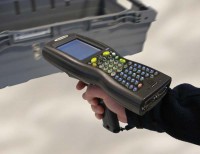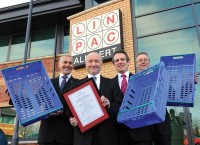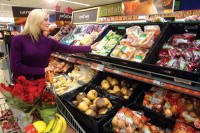 LINPAC Allibert, global expert in plastic returnable transit packaging for the food, retail, distribution and manufacturing sectors, offers a range of products and services to drive efficiencies in the supply chain.
LINPAC Allibert, global expert in plastic returnable transit packaging for the food, retail, distribution and manufacturing sectors, offers a range of products and services to drive efficiencies in the supply chain.
The company has invested heavily in new products and services designed to minimise carbon footprint and optimise supply chain efficiency.
One area where LINPAC Allibert has really developed its portfolio is in services which add value to its customers, whether this is washing and refurbishing crates or developing sophisticated asset management systems that minimise losses in the grocery supply chain.
LINPAC Allibert helps NLP stay on track
LINPAC Allibert is helping Norway’s leading pallet and tray pool operator for the grocery sector, Norsk Lastbaerer Pool (NLP), to reduce losses and boost efficiency in its fleet operations.
NLP was set up by Norway’s two leading grocery trade associations, representing both suppliers and retailers, to deliver cost-effective and environmentally-friendly return and re-use systems for returnable containers and pallets in the Norwegian grocery industry.
LINPAC Allibert’s RFID-enabled Maxinest+ produce trays are helping NLP customers to benefit from faster supply chain trip cycles, accurate ‘real-time’ inventory and reduced losses.
 Details of supplier, content, customer location, washing and delivery schedules are input into RFID tags at the distribution centre. The receiver scans the crates and pallets through an RFID portal to access all information which is automatically sent through to the ERP system. NLP’s asset management system ensures that the precise quantity of trays is delivered to the right place at the right time.
Details of supplier, content, customer location, washing and delivery schedules are input into RFID tags at the distribution centre. The receiver scans the crates and pallets through an RFID portal to access all information which is automatically sent through to the ERP system. NLP’s asset management system ensures that the precise quantity of trays is delivered to the right place at the right time.
LINPAC Allibert’s new line-side production of RFID-enabled distribution containers and produce trays has not only led to improved production efficiencies and greater reliability, but has also enabled customers to input data to their inventory prior to receipt, resulting in much faster processing of stock.
Two water and shock-resistant RFID tags are applied at the point of manufacture and the RFID-enabled trays are then individually validated by a test reader before being palletised. The full pallet loads then pass through a portal which records quantity and acts as a fail-safe check that the tags are working.
Customers receive the serial numbers by email for upload onto their system. This provides an instant quantity check at delivery and allows the quality-assured trays to be released directly into the supply chain. The owners of the containers can have their logo along with barcode printed on the outside, allowing the container to be easily identified and tracked at every point in the supply chain.
The new trays are a vital part of NLP’s RFID rental package, which is designed to optimise efficiency and cost savings for the customer and avoid the need for investment in expensive equipment and training. This new system is able to deliver a complete return on investment within a matter of weeks.
Mikael Ruotsalainen, LINPAC Allibert’s sales manager for Scandinavia, explains: “Our RFID enabled containers are proving to be a vital component in helping our customers to manage cost out of the supply chain. By improving process efficiency and minimising losses they achieve payback within a very short space of time. This combined with the durability and flexibility of our containers, makes them a vital part of hard-working supply chains that need to demonstrate efficiency at every stage.”
Ragnar Strand, Managing Director at NLP, added: “As a company, we are committed to designing the best solutions for our customers and LINPAC Allibert’s trays play a key role in the performance of our pool operations.”
Taking the lead in carbon footprint measurement
 Another area where LINPAC Allibert has demonstrated its pioneering spirit is its commitment to increase lightweight plastic RTP that delivers genuine fuel efficiencies during its lifetime. In fact, LINPAC Allibert was the first organisation in the transit packaging and supply chain solution sector to have the full life cycle carbon footprint of a specific product determined and independently verified by a recognised certification body, Lloyds Register Quality Assurance.
Another area where LINPAC Allibert has demonstrated its pioneering spirit is its commitment to increase lightweight plastic RTP that delivers genuine fuel efficiencies during its lifetime. In fact, LINPAC Allibert was the first organisation in the transit packaging and supply chain solution sector to have the full life cycle carbon footprint of a specific product determined and independently verified by a recognised certification body, Lloyds Register Quality Assurance.
The initial carbon footprint analysis was carried out by Sustain Limited, the carbon reduction company, under Europe’s most authoritative product carbon footprinting specification PAS 2050.
The findings applied to two ranges of LINPAC Allibert plastic crates manufactured in polypropylene at its plants in France, Germany, Spain and the UK. The data is based on a functional unit of one litre volume of goods transported per trip. Raw materials transport and energy use in the manufacturing process, distribution from LINPAC Allibert’s sites and eventual disposal and recycling are also taken into account.
The performance of the folding and Maxinest trays is compared to a standard cardboard box FEFCO (code 0411), 600 x 400 x 180 mm, weighing 0.654 kg, used for a single trip and then collected and disposed of or recycled after each trip and again includes transport and manufacturing, raw materials and energy use.
The findings demonstrated that carbon parity is achieved at only 20 trips, after which RTP has an increasing advantage over cardboard.
The carbon footprint of LINPAC Allibert’s RTP is 67.8 per cent less than cardboard. Over five years, plastic crates typically make a total of 92 return trips. Based on this criterion, the folding container has a carbon footprint of 23.014 CO2 kg per unit over its working life and the Maxinest tray has a carbon footprint of 26.304 C02 kg. For the same usage, cardboard has a carbon footprint of 71.442 CO2 kg per unit. (This measurement is specific to the Linpac Allibert manufacturing process and is therefore not transferable to similar products manufactured elsewhere.)
The carbon footprint of the Maxinest distribution tray was determined at 26 kgCO2e in total, or 0.0082 kgCO2e per litre, per trip, based on each crate performing 92 return trips on a 20 day cycle over five years. The findings take into account the full life cycle of the trays including raw material production, manufacturing, customer use (including transportation and crate washing) and disposal or recycling at the end of its working life.
 Independent verification by LRQA, a member of the Lloyd’s Register Group and global leader in independent climate change validation, verification, training and certification, confirms the findings of the assessment and the methodology used and is the first to be carried out by LRQA against this standard.
Independent verification by LRQA, a member of the Lloyd’s Register Group and global leader in independent climate change validation, verification, training and certification, confirms the findings of the assessment and the methodology used and is the first to be carried out by LRQA against this standard.
During the consultation process, Sustain developed a software toolkit to calculate the footprint figure. By adjusting a number of parameters within this model LINPAC Allibert can now calculate the life cycle emissions (kg of CO2e) arising from the end user’s application, giving them an accurate carbon saving comparison against cardboard.
Danilo Oliynik, LINPAC Allibert’s commercial director, said: “We are delighted to be the first company to receive this certificate from LRQA. It provides tangible, independently verified data that will help our customers to reduce their carbon footprint by exploiting the lower carbon footprint of plastic returnable transit packaging.”
The PAS 2050 certificate was presented by LRQA’s managing director, Mike James, who added: “The importance of independently verified carbon footprint data will continue to grow, as future educated consumers begin to base their purchasing decisions on the transparency and credibility of environmental data from organisations and products.”
Looking forward, Paul Smith, LRQA’s climate change manager, said: “As more companies follow LINPAC Allibert’s lead, environmental performance will be enhanced, and verified product carbon footprint data will become an increasingly important factor in both domestic and commercial purchasing decisions.”
Sustain’s Michael Hill commented: “It has been a pleasure to work with LINPAC Allibert because complete transparency was a requirement from the outset, leaving us to explore every component of the Maxinest tray’s full life cycle carbon footprint. LRQA was recommended for verification because it’s a credible organisation with a world-wide reputation and has specific climate change expertise.”
A long-term commitment
Innovation is central to LINPAC Allibert’s offer to the grocery supply chain. With a design and NPD team containing knowledge and experience totalling more than 180 years, and hundreds of patents filed, the company has a history of developing award-winning products and services which continue to add value to its customers.
Danilo Oliynik, commercial director at LINPAC Allibert, explained: “Our business is devoted to helping customers achieve efficiency savings and optimise the performance in their supply chains. As specialists in the retail and grocery distribution sector we have been able to establish best practice which has enabled even the most demanding customer to make cost savings without compromising on the quality and reliability of its distribution network.
“In the future we will continue to bring new products and services to market which enhance our customers’ performance in a highly competitive market which itself is coming under increasing cost and environmental pressures to deliver year-on-year savings.”
LINPAC Allibert
tel: 0121 506 0100




Comments are closed.